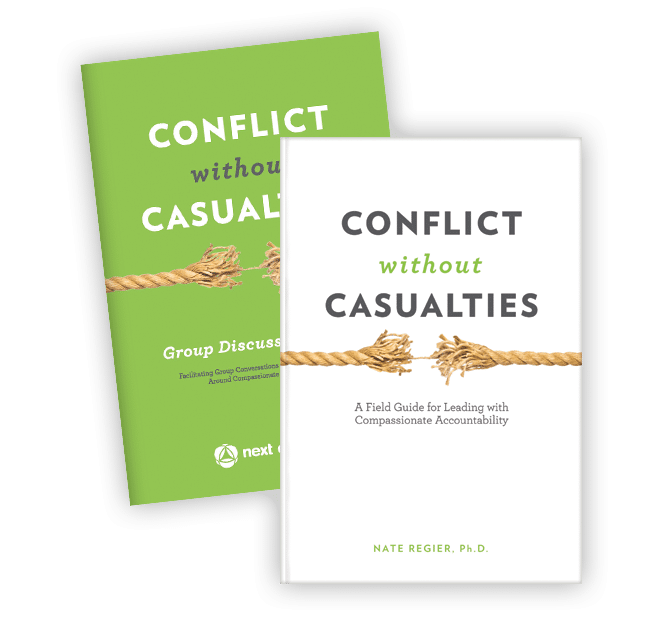
Can I Trust You To Trust Me?
Share viaPeople who are big on trust says it takes years to earn, and seconds to destroy. This seems ironically one-sided and hypocritical to me.
I’ve spent a long time earning your trust by following through on commitments, making good on promises and being honest with you.
Now I have a few questions for you.
- When I make a mistake, can I trust you to forgive me?
- When you are surprised by a decision I make, can I trust you to ask about my motives before jumping to conclusions?
- When you feel afraid or embarrassed about something did, can I trust you to be transparent with me about your feelings?
Can I trust you to trust me? This is compassion. This is “struggling with.”
Trust is not static. It is given and earned every day. Over and over.
Trust starts and ends with openness.
Trust is about behavior, not expectations.
Copyright 2017, Next Element Consulting
Join our community to receive weekly articles and tips.
Conflict Without Casualties: A Field Guide for Leading With Compassionate Accountability. This book is the foundation for our Leading Out of Drama program, a comprehensive guide for balancing compassion and accountability to build relationships that are safe, curious, and consistent.
Book Your Next Keynote Speaker

Author and Co-founder of Next Element, Dr. Nate Regier is available to speak at your upcoming event.
Submit a Speaker RequestPodcast: Listen to Nate "On Compassion"
 Listen to the Podcast
Listen to the Podcast




5 Comments
I loved you insightful article here. Trust is a different perpective altogether depending on our personality structure. I will trust someone who’s not very reliable under the condition I feel they are truthful and aware of their flaws + they love and accept mine. Of course my point of view here is related to my Promoter base and Rebel phase identified in Process Communication.
Thanks Jerome. I agree that each personality type defines and experiences trust differently, and it boils down to two main questions. 1) Can I count on you? and 2) Am I safe with you?
Add comment
Add comment
Hi Nate, hope you are all doing well at Next E. I’m wondering if you can expand on your comment that “Trust is about behavior, not expectations.”
Sure, Scott. Thanks for commenting. Expectations are a thief of happiness because they involve trying to control the future. The only thing we can control is our intentions toward actions – behavior in the moment. Expectations are one of the most dangerous threats to trust because they lead to assumptions about others’ intentions.
Add comment
Add comment
I recommend to you a book by Dr. John Gottman, my favorite relationship psychologist: “The Science of Trust.”
I think it depends on what is meant by “seconds to destroy.” It is possible to reach a tolerance point in a person and go past it, thus causing them not to trust anymore. When that happens, Gottman would say the “betrayed” party is likely to “withdraw,” one of his “four horsemen” of disaster in relationships (the other three are Criticism, Contempt & Defensiveness).
I also observe that some people are just not “safe.” Being open to them can lead to lots of damage.
My two cents from the world of conflict/conflict resolution/mediation.
Sue Ann, I’d argue that being able to “trust” another person is more about me than them. The real question is how strong is my belief in my own OK-ness so that it isn’t fragile and dependent on how another person treats or responds to me.
Add comment
Add comment
This is a little different than my go-to thought on trust: “Strong as steel; fragile as glass.” All depends on the variables in play.
I’m with you Garth. And, one of the variables at play is each person’s persistence in continuing to trust the other person. If trust is fragile as glass, what does that say about the person who is trusting? It runs counter to these people’s other gifts for sticking with things, loyalty, and perseverance.
Add comment
Add comment
Who will show us some compassion, tolerance & patience until we’ve made our accounting? Our accountability is nigh on a never ending story. The Trust you are talking about is just an observation of the fact-of-life that we depend upon one another to shore up our individual shortfalls. For one to be thrust out of the supportive community; and thus deemed unworthy of prosperity, rights & freedoms that we think we each deserve, is the travesty of injustice! The will to condemn or punish our companions in life due to a perceived flaw or defect in character, condemns us all. We are all subject to the broadest aspects of human-nature as it is played out upon the World Stage. Of course we can not help but to make the judgments of comparison, our own character and accomplishments next to our peers. So the trick really, is not to avoid making judgments, but to avoid willing negative consequences as a result of those judgments.
Thank you Ken. I appreciate your perspective and clarification about wanting to harm people because they are different.
Add comment
Add comment
Add comment